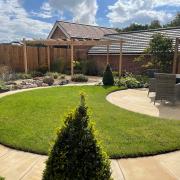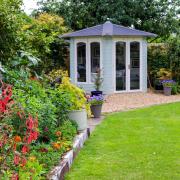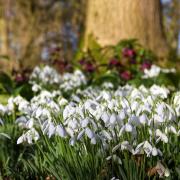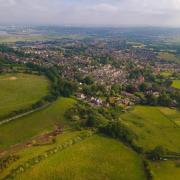Letting parts of your garden grow wild can help maintain the natural balance of the ecosystem, which means plants, insects and animals thrive. Insects such as bees and butterflies are important pollinators that encourage healthy flowers and vegetables. Wildlife makes your garden come alive, as well as make us feel happier.
Here are more reasons to let your garden grow

PROVIDE FOOD AND SHELTER FOR WILDLIFE IN YOUR GARDEN
Allowing your garden to grow can provide food and shelter for various species of wildlife. Plants such as bird’s-foot trefoil, clover, oxeye daisy and ragged-robin can attract bees, butterflies, and other pollinators as well as make your garden colourful. Additionally, long grasses and overgrown shrubs can offer a haven for birds and small mammals to hide or nest in.
ENCOURAGES BIODIVERSITY
A well-manicured lawn typically has a limited number of plant species. As more and more houses are built it’s more important than ever that each garden contributes to supporting wildlife in some way to maintain a healthy ecosystem. As our world becomes increasingly urbanised, gardens, yards and balconies can provide valuable green spaces for both humans and wildlife.
REDUCES CARBON EMISSIONS
Mowing your lawn contributes to carbon emissions, which can negatively impact the environment. By allowing your grass to grow, you can reduce the amount of time and energy spent on mowing, thereby decreasing your carbon footprint. It’s quite exciting to see what species your garden supports by simply letting it grow.
REDUCES WATER USE
Maintaining a lawn requires a significant amount of water, especially during dry periods. Less mowing and more growing can reduce the amount of water needed to maintain it, as the plants that grow naturally are often more drought-resistant than the typical grass varieties found in a well-manicured lawn.
SAVES TIME AND MONEY
You won't need to spend as much time and money on mowing, watering and fertilising your lawn, which can give you more time to enjoy your outdoor space and more money to spend on other things.
By creating a diverse ecosystem, reducing carbon emissions, saving water and saving time and money, you can help support the health of the planet. So, next time you're tempted to reach for the lawnmower, consider letting it grow instead.
If letting your grass grow fills you with dread and the idea of a wild garden is too much too soon, there are alternatives to help bring wildlife back to Cheshire.

Plant native species: Native plants are adapted to local conditions and provide food and habitat for native wildlife. Choose plants that are native to your area and that flower at different times of the year to provide a constant food source for pollinators.
Provide water: A shallow dish of water can be a lifesaver for wildlife, especially during hot weather or in areas where water sources are limited. You can also add a pond or water feature to attract a wider range of wildlife.
Create new habitats: Log piles, rockeries and wildflower areas provide shelter and nesting sites for a variety of creatures. Leave a corner of your garden to grow wild and avoid the urge to tidy up fallen leaves and dead vegetation as they can provide shelter for insects and other small creatures.
Avoid pesticides: Pesticides not only harm unwanted pests but also harm beneficial insects such as bees and butterflies. Use natural alternatives such as companion planting or handpicking pests to control unwanted insects.
Provide food: Bird feeders, insect hotels, and nesting boxes are ways to provide food and shelter for wildlife. Clean bird feeders regularly to prevent the spread of disease.
Reduce light pollution: Excessive light can interfere with the natural behaviour of nocturnal animals such as bats and moths. Reduce light pollution by using motion-activated or low-level lighting.
Go organic: Using organic methods to grow your garden is not only better for the environment but also creates a healthier ecosystem for wildlife.
Creating a wildlife-friendly garden requires a little effort on our part but can make a big difference in supporting wildlife and local ecosystems. By planting native species, providing water and shelter, avoiding pesticides, providing food and reducing light pollution, you can create a garden that supports a diverse range of wildlife and brings you closer to nature.
We have lots of different toolkits on our website, which have been designed to support you in creating a wildlife haven in your garden. Visit cheshirewildlifetrust.org.uk/download-toolkits
We also have simpler actions on our take action page: cheshirewildlifetrust.org.uk/take-action
Share what you do for wildlife in your gardens with us by emailing info@cheshirewt.org.uk or via Twitter, Facebook or Instagram.



























